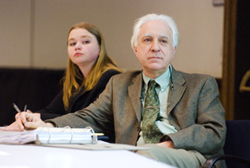Filed Under > Research/Publications
Education, Very Broadly Defined
When Herve Varenne earned his Ph.D. in the 1970s, his grandmother, whose formal schooling had stopped in the sixth grade, told him, "Remember, you may have more instruction than I have, but you are not more educated."
Varenne's grandmother's viewpoint is strongly in evidence in "Explorations in the Theory of Education: Anthropological perspectives," a special issue of the Teachers College Record guest edited by Varenne, now an eminent cultural anthropologist and Professor of Education in the Department of International and Transcultural Studies, that will be published in July 2007.
"Cremin urged researchers to remember that education is more than schooling," Varenne writes in the very first sentence of his abstract, referring to the late TC President and educational historian Lawrence Cremin.
Citing Cremin's notions of "building" and "deliberating," Varenne goes on to sketch a vision of education in which people are active agents rather than passive absorbers, in which "human beings are not so much shaped as shaping, not so much transformed as transforming." The papers that follow his introduction illustrate "how all people do educate themselves, in a wide series of settings and historical conditions," including those of "enslaved people in the early United States, Hmong girls in Thailand, adolescent girls in Jordan, poor, shamed Brazilian women, students in a small liberal arts college, teachers and administrators in a Jesuit school for Mexican immigrants, health care professionals in Sweden, activists in New Zealand, museum curators and the people who visit their exhibits."
Contributors to the issue, about two-thirds of whom are TC students and faculty, include Lesley Bartlett, Assistant Professor of Education, and visiting professor Fida Adely. All the contributors are anthropologists who graduated from either TC's program or those at Chicago, Yale and Stanford.
Varenne's theory of education has political overtones, though Varenne himself may be impossible to pigeon-hole as either liberal or conservative. For starters, he flies in the face of much current conventional wisdom that holds that the first three years of life are critical for forming not only minds but future life chances.
"All the case studies in the special issue take us out of the world of early learning and into the world of continued efforts to change both oneself and one's consociates through often difficult collective deliberations," Varenne writes, adding that in the literature of the past half-century of social science research, "participants are, often unwittingly, made passive carriers of what was once called -'cultures of poverty.'"
Is Varenne blaming people who don't escape their poverty, then? Praising those do? "In fact, we try to move away from the language of blame," he says. "We believe problems originate from institutions, not the individuals who are affected by them. Thus, when children fail a high-stakes test, the problem does not lie in some personal property of the child. It does not even lie in the design of the test. The problem lies in these tests having been made so important in children's careers."
Varenne says that even well-intentioned institutions that seek to ensure social welfare can obscure (or even suppress) the initiative of individuals, who rarely follow any social program as legislated. To counter that tendency, he says, he and the other authors contributing to the special issue emphasize "the wealth of what people are able to do with and against their conditions.
"We intend to bring out the collective efforts to deal with difficult conditions and transform them through everyday learning and teaching," Varenne writes. "Our goal is to show that all people, everywhere, are involved in such efforts.
"If religion, ideology, artistic tastes, technologies and so on must be seen as developing essentially in and around institutions uneasily controlled by the -'public,' then the conversations by school people about schooling (its policies, prerequisites and consequences) miss what remains most powerful in human life - he continued efforts by all to transform their conditions."
Varenne is quick to add that "those conditions" include schooling itself. With that in mind, he currently is collaborating with TC Professor Emeritus Edmund Gordon and post-doctoral fellow Linda Lin on an ethnographic study of non-school settings in Harlem - churches, community groups, street situations - where significant education occurs.
Readers who wish to comment on the studies in the TC Record special issue may do so by visiting:
www.studyplace.org/wiki/index.php?title=Talk:Anthropological_perspectives_on_educational_research
Published Wednesday, May. 9, 2007
